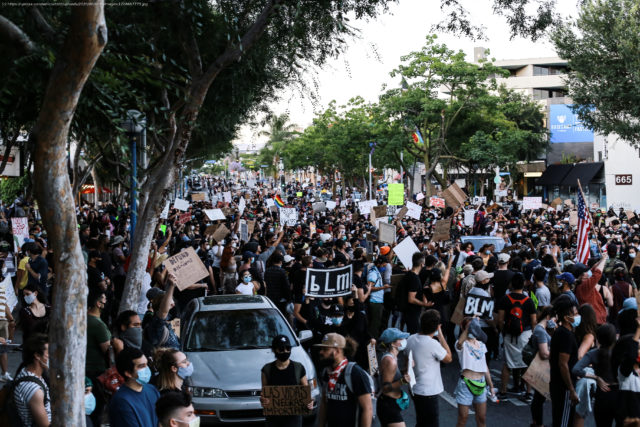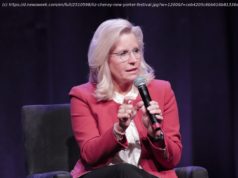Black Lives Matter LA’s Melina Abdullah talks about defunding the police, reforming the system, and why we need to stay in the streets.
On May 25th, police officers in Minneapolis arrested 46-year-old George Floyd after a convenience store employee alerted 911 that he may have paid with a counterfeit $20 bill. Once apprehended by the police, officer Derek Chauvin pinned Floyd to the ground, driving his knee into Floyd’s neck for eight minutes and 46 seconds, despite onlookers calling for him to stop and Floyd’s own desperate pleas for help. Video of the killing sparked protests in all 50 states and around the world –resulting in significant actions being taken across all quadrants of our society. Laws are being changed, police departments have been defunded, and statues of colonizers and slave traders have fallen.
Melina Abdullah, an activist, professor, and co-founder of Black Lives Matter’s (BLM) LA chapter, knows that if we really want to change the world, the protests must also give rise to calculated political action.
“Make sure you research who your DA is and whether or not you want to keep them,” Abdullah urges, after weeks of leading demonstrations across Los Angeles (including outside the home of Mayor Eric Garcetti). “The district attorney is an elected official who prosecutes crimes, so we want to make sure that as they’re prosecuting, the first people who go to jail for committing crimes are the police who brutalize and kill our people.”
Abdullah and Black Lives Matter LA have been at the forefront of the protests in Los Angeles, helping the city demand accountability from its police department and elected officials like never before. Since taking to the streets, Angelenos have prompted Garcetti to reexamine a budget that would allocate 54% of the city’s funds to law enforcement agencies and promise a $250 million cut from the LAPD, with money redirected towards health and education in black communities. The mayor has also floated the idea of implementing an independent prosecutor to oversee police violations.
Anger at an unjust system is easy to muster, but turning that rage into a tool to bring about meaningful and systemic change is crucial. Many of us who have taken to the streets don’t know what to do after we’ve made signs, marched, signed the petitions, and donated our money to organizations like BLM. So we reached out to Abdullah to talk about the next steps, defunding the police, and why we need to vote in this upcoming election, even if we’ve lost faith in our government.
I wanted to talk to you a little bit about defunding the police. On the surface that might sound a little bit extreme to some. For the people who wonder who will keep the law if we massively scale back police funds, what would you say to those concerns?
I think that defunding the police sounds radical until we realize that there wasn’t always policing and there wasn’t always this kind of expansionist approach to policing. So when we say “defund the police,” we mean defund the police. Here is something else that should be equally shocking, if not more. In the city of Los Angeles, the mayor was proposing to spend 54% of the city’s budget on the LAPD. That is an astronomical amount, especially when you consider that we’re in a health pandemic with an economic fallout and that policing doesn’t answer a healthcare crisis or an economic crisis.
LAPD was the only city department that Mayor Garcetti proposed an increase for, as he’s slashing other city departments and furloughing 16,000 city employees in the midst of this economic crisis. Some will say that defunding the police sounds radical but I think that they should also look at how radical it is or how shocking it is to be spending so much money on police.
Finally, everybody says things are “crazy” or “radical” or “impossible” until they’re done. The city of Minneapolis just committed itself to disbanding their police department, so I think that shows us that it is possible. If people look at PeoplesBudgetLA.com, they’ll see that when we engaged in a participatory budgeting session with Angelenos, they wanted to spend 5.7% of the city’s budget on traditional approaches to law enforcement. That includes the LAPD, that includes traffic enforcement and includes the city attorney’s office, which is the prosecutor for the city. People don’t want to spend this kind of money on police. When we look at those survey results, people saw this kind of approach to law enforcement as the “least important” of their spending priorities.
Saying “defund the police” really just moves us towards what most people say they want anyway.
You’ve been center stage in the effort to prevent Mayor Garcetti from passing his city budget and even with the $150 million cut that still leaves over $3 billion for law enforcement, before the cut that was 54% of the city’s budget. In your view, what is a better way of using that money and what kind of community organizations and things should we do with that money instead?
I think everybody wants to live in a safe, healthy, and vibrant community. When we think about how to get there, we know that the first thing we need to do is meet the universal needs of people, make sure that everybody has housing, make sure that everybody has healthcare, make sure that everybody has access to healthy food, make sure that we have parks and libraries and after school programs. I think you make a safe environment by providing first for the needs of people.
Angelenos don’t like being home to the largest houseless population in the nation.
Home
United States
USA — mix Black Lives Matter-LA Co-Founder Melina Abdullah Talks About Defunding The Police And...






